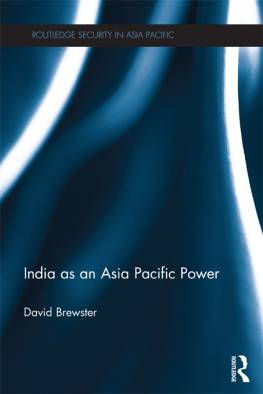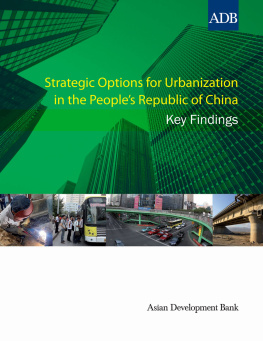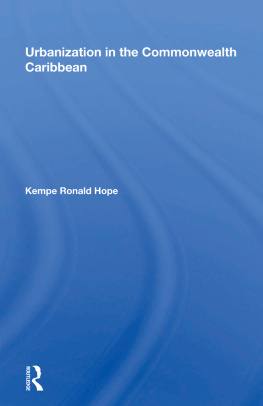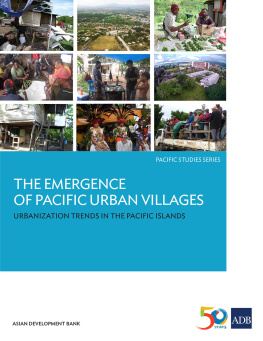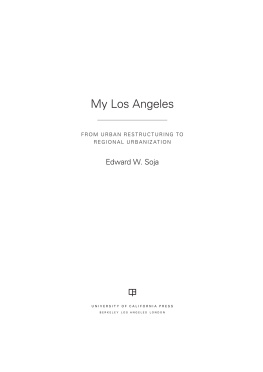First published 1987 by Westview Press
Published 2019 by Routledge
52 Vanderbilt Avenue, New York, NY 10017
2 Park Square, Milton Park, Abingdon, Oxon OX14 4RN
Routledge is an imprint of the Taylor & Francis Group, an informa business
Copyright 1987 by the East-West Center, except for Chapter 12, which is 1987 by the World Bank
All rights reserved. No part of this book may be reprinted or reproduced or utilised in any form or by any electronic, mechanical, or other means, now known or hereafter invented, including photocopying and recording, or in any information storage or retrieval system, without permission in writing from the publishers.
Notice:
Product or corporate names may be trademarks or registered trademarks, and are used only for identification and explanation without intent to infringe.
Library of Congress Cataloging-in-Publication Data
Urbanization and urban policies in Pacific Asia.
(Westview special studies on East Asia)
Bibliography: p.
Includes index.
1. Urban policyAsia. 2. UrbanizationAsia.
I. Fuchs, Roland J. II. Jones, Gavin W.
III. Pernia, Ernesto M., 1943- . IV. Series.
HT147.A2U73 1987 307.7'6'095 87-6105
ISBN 13: 978-0-367-21281-0 (hbk)
As the close of the twentieth century nears, it becomes increasingly clear that among the most significant developments of the century has been the accelerating pace of world urbanization. In both developed and developing nations, dramatically greater proportions of the population have become concentrated in urban areas. In 1900 only 13.6 percent of the world's population resided in urban places, but the United Nations projects that by the end of the century almost half (48.2 percent) of the world's people will be urban residents. Urban places contained only about 218 million persons at the beginning of the century. By 2000 there are projected to be 2.8 billion urban residents, a thirteenfold increase.
In earlier years urbanization was associated primarily with the developed economies, but during the course of this century it has had great impact on the developing economies. At midcentury, urban populations constituted over half (53.6 percent) of the populations in the developed countries but only one-sixth (17.3 percent) of those in the developing countries. It is projected that by the year 2000 the proportions urban will be over three-fourths (77.8 percent) in the developed countries and about two-fifths (40.4 percent) in the developing countries.
Since Biblical times, urbanization has had profound effects on people's lives. It transforms their values, attitudes, behaviors, and life styles in general. It also drastically changes the ways in which people make their living. During the twentieth century, increasing urbanization has probably generated greater social and economic change than occurred in the preceding millenium.
As this volume reports, urbanization is proceeding at a rapid, though variable pace, in Pacific Asia. It was therefore appropriate for a Conference on Population Growth, Urbanization, and Urban Policies in the Asia-Pacific Region to be organized. Held in 1985 and jointly sponsored by the Population Institute of the East-West Center and the National Centre for Development Studies of The Australian National University, the conference was not only timely but also pragmatic. It was designed to consider the most recent urban research findings and strategies, to point to the needs for further research, and to develop for planners, administrators, and other urban specialists critical policy considerations.
as a participant in the conference I can attest that the conferees, from both within and outside the region, were seasoned urban researchers, planners, and policy advisors. The papers they prepared, tempered by critical review and subjected to intensive and extensive discussions, constitute a much-needed and useful volume.
As editor of Urbanization in Asia and the Far East, published by UNESCO in 1957, and as chairman of the Social Science Research Council Committee on Urbanization from 1958 to 1965 and coeditor (with Leo F. Schnore) of The Study of Urbanization, published in 1965, I am in a better position than most to discern the progress that has been made in urban study during the course of one human generationfrom about 1960 to the present. The advances made can be summarized as follows:
The magnitude and scope of quantitative data on urbanization have greatly increased.
The number of social science disciplines and personnel engaged in many aspects of urban research has grown.
Advances have been achieved in research methodologies, especially in econometric models and statistical analysis.
There has been a notable increase in the number of urban scholars, planners, and policymakers from developing countries, including those from the People's Republic of China.
There has occurred a visible increase in the number of women engaged in various aspects of urban research, planning, and policy decision making.
Awareness has increased among governments of the need for urban data, research and policy formulation in general development planning, and policy implementation.
Urban scholars have become much more concerned with the policy implications of their research and are writing prescriptive as well as substantive findings.
If one looks back a full generation, there can be no doubt that the corpus of urban knowledge has materially increased. If one evaluates present urban knowledge in relation to the needs for policy decisions, however, one must conclude, as some of the chapters in this volume do, that much remains to be done to build a more solid foundation of knowledge to justify policy recommendations. This, of course, is one way of calling attention to present knowledge limitations of some of the chapters, especially of those that are prescriptive.
Among the gaps in knowledge about urbanization are those that arise from disciplinary limitations. What is needed is an holistic approach to the study of urbanization. The economist who deals only with economic variables, the geographer who is concerned only with spatial, environmental, and related factors, the sociologist or political scientist who limits his studies to sociological or policy factorseach obviously is subject to disciplinary limits. To be sure, some scholars attempt to deal with variables outside the framework of their own disciplines, but these occasional investigations do not meet the need for genuine interdisciplinary and comparative study, which for the most part remain to be undertaken.
Since the present volume reflects the state of the art, the reader will perceive much that requires synthesis and future research. Nevertheless, the quality of the chapters and the critical assessments they provide of urban issues, policy alternatives, and research needs ensure that this volume will receive wide attention among development planners, urban managers, and scholars in the field of urban and development planning.





